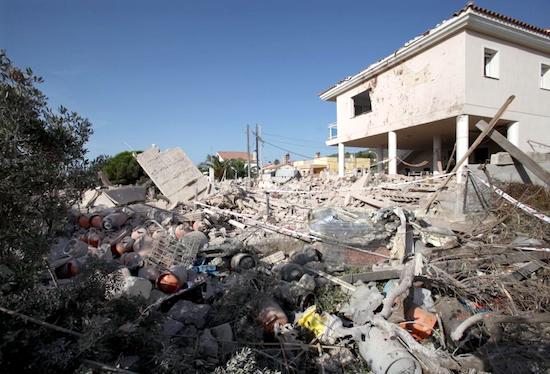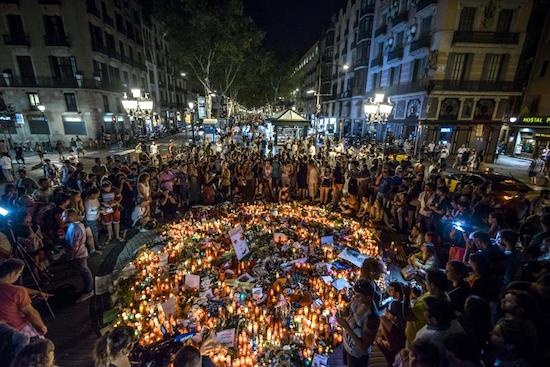Once again, Europe has been struck by Islamic terrorism. In Barcelona, a van plowed into a crowd on one of the city’s most popular streets, Las Ramblas, killing 13 people and wounding more than 100. The driver of the van escaped. Shortly thereafter in Cambrils, a short distance south of Barcelona, five terrorists went on a second spree, killing one person and wounding dozens more in a vehicle attack before being killed by police.
It turns out that the terrorists were part of a cell that included at least 12 people, of whom five have been killed, four have been captured, and two died in an explosion. Only one, Younes Abouyaaquoub, believed to be the driver of the van who struck in Barcelona, is still at large. The terrorists are Moroccans who lived in Ripoll.
Authorities now believe that the cell, allegedly under the direction of an imam named Abdelbaki Es Satty, planned a much bigger attack. But hours before Abouyaaquoub drove his van into the crowd at Las Ramblas, a house in Barcelona blew up in an accidental explosion. The house was leveled:
The authorities discovered numerous gas canisters on the premises, which for some reason didn’t explode:
It is now believed that the terrorists intended to use multiple vans, loaded with the gas canisters, to blow up landmarks in Barcelona, like the Sagrada Familia cathedral. When the terrorists’ base of operations blew up, the survivors apparently decided to carry out a much cruder attack:
Josep Lluis Trapero of the regional police of Catalonia said the two blasts thwarted further terror attacks in the Spanish city.
He said: “The explosion in Alcanar meant the terrorists no longer had the necessary materials to prepare more widespread attacks on Barcelona.
“They were probably looking for a different kind of attack”.
The imam who directed the operation is believed to be one of those killed in the accidental explosion.
Worshippers at the imam’s mosque in Ripoll have denounced the attacks and expressed sympathy for the victims. But one wonders: did they really have no idea that their imam was radicalizing young Moroccans and organizing a major terrorist attack?
Another Muslim terrorist struck in Turku, Finland. He attacked women on the street with a knife, killing two of them and wounding eight people, some of them men who tried to come to the women’s aid. Witnesses said that the murderer yelled “Allahu Akbar!” as he carried out his attack.
The terrorist, an 18 year old Moroccan, was shot in the leg by police and captured. Four other Moroccans have been arrested and one more is being sought. It is not clear from news reports what their role in the attack may have been.
Why are there Moroccans in Finland? I don’t mean that facetiously, I really don’t know. Morocco is relatively habitable and accepts refugees from other countries, like Syria.
A third knife attack occurred in Surgut, Siberia, for which ISIS has claimed responsibility. But it is not yet clear whether this was another instance of Islamic terrorism. The knifeman may have been mentally disturbed.
How are Europeans responding to these latest attacks in a long series? Reuters reports: “After Barcelona attack, defiance in European capitals.” But the defiance sounds more like fatalism:
In European capitals that have already seen such attacks — London, Paris and Berlin — the mood on Friday was one of defiance tinged with an acknowledgement that some visitors might be scared off.
“It’s very scary, but at the end of the day, it’s not going to deter me,” said British tourist Stephen Bishop, 47, outside Paris’s Bataclan Theatre where 89 people were killed when it was stormed by Islamists in 2015.
“My message is, don’t give in. Don’t be a coward. Live your life as normal,” Bishop said.
On Berlin’s Breidscheidplatz, where 12 people were killed in a truck attack on a Christmas market last year, people were philosophical.
Steps are being taken to prevent vehicle attacks in selected locations:
In Paris police and military units patrol the main tourist sites and permanent barriers and concrete blocks have been erected, particularly at entrances to the banks of the Seine where pedestrians gather.
Similar defenses have been put up on bridges across the Thames in London and police, who still routinely do not carry guns, have stepped up armed patrols.
But no one imagines terrorist attacks, especially those using vehicles as weapons, can be stopped entirely:
“The problem is that you can tighten the net, but there will always be holes. There is nothing simpler than carrying out an attack of this kind,” said a Paris town hall official.
***
“I think you’re safer here than anywhere else in London, said fruit stall owner Jock Stark, 68, who has worked in the market for 50 years. “How can you stop it? It’s something we’ve got to live with nowadays.”
***
For those like pensioner Marion Harrison, visiting Borough Market with her family from Manchester, if the militants aim was to scare people, then they had failed.“I didn’t hesitate to come,” she said. “I’ve been down Las Ramblas three or four times. It wouldn’t stop me going again, the same as it wouldn’t stop me going again to any of the other places. We’re not put off. You can’t live your life in fear.”
What we are seeing is, I think, John Kerry’s view of terrorism as a “nuisance.” It can’t be stopped, but the likelihood of being a victim is, so far, small. So we should all go about our business and not be frightened.
I think that is a good attitude as far as it goes–it is the one that I adopt when I am a tourist in Europe–but notably absent is any sense that Islamic terrorism can actually be prevented, and ultimately defeated. Also missing is any reference to immigration policy. Most likely, for some European countries, it is too late for that.
Europeans are big on creating impromptu memorials and holding vigils to mourn victims of Islamic terrorism:
Again, there is nothing wrong with that. But where is the fighting spirit? The anger? The determination to crush terrorists like bugs? We see that here in the United States, but in Europe it seems that Islamic terrorism is viewed much like cancer or heart disease, an unfortunate aspect of life for which no cure has yet been found. I hope that assessment is wrong; in some countries we have seen what looks like a strong anti-terrorist effort. But at the moment, the jury is out.
UPDATE: The Siberian stabbing rampage is looking more like Islamic terrorism, although this is still not certain.




Notice: All comments are subject to moderation. Our comments are intended to be a forum for civil discourse bearing on the subject under discussion. Commenters who stray beyond the bounds of civility or employ what we deem gratuitous vulgarity in a comment — including, but not limited to, “s***,” “f***,” “a*******,” or one of their many variants — will be banned without further notice in the sole discretion of the site moderator.